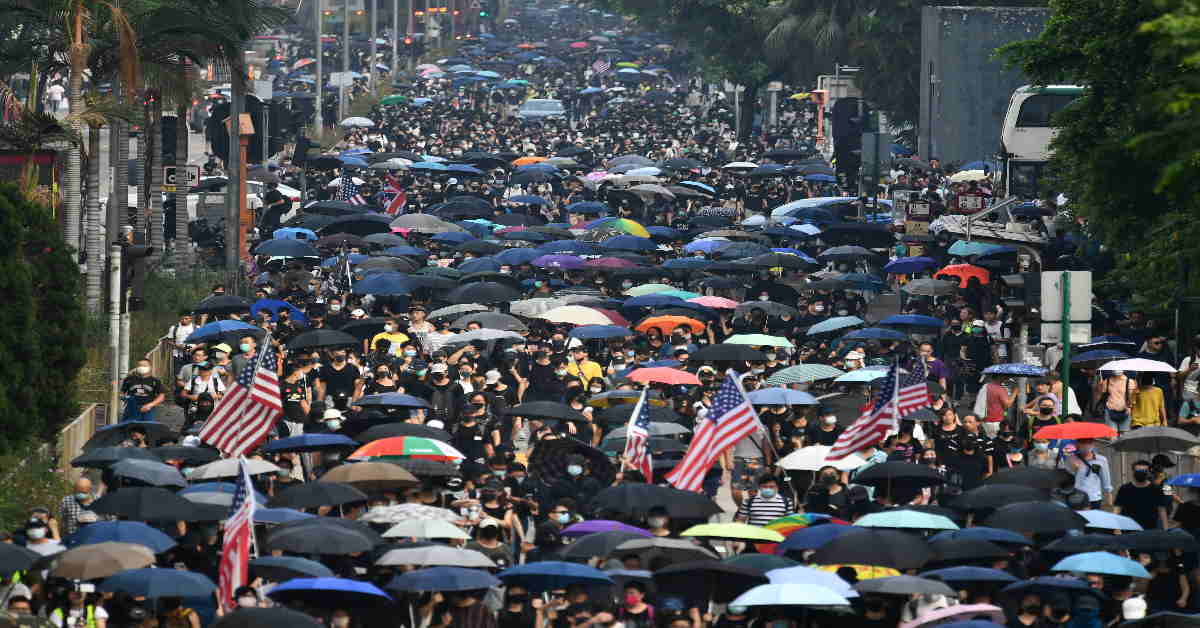The demonstrations and the political crisis in Hong Kong are now into their fourth month. Every weekend, people take to the streets to protest against their government and the armlock in which China’s communist regime holds it. And for now, at least, there seems to be no resolution in sight.
The political drama began with protests against the attempt by Hong Kong’s chief executive, Carrie Lam, to introduce a bill allowing the city’s citizens to be extradited to mainland China. The understandable fear across the city was that the bill would destroy the firewall between the rule of law in Hong Kong and the rule of the Communist Party of China (CPC) across the border. After all, it is communist law that incarcerates people in “re-education” camps in China’s Xinjiang region, and jails lawyers and human-rights activists who are brave enough to speak up. Promised a share in President Xi Jinping’s China dream, all Hong Kong’s citizens could see was a nightmare.
An issue that had mobilised two million people to demonstrate peacefully then morphed into something much more complicated. First, the Hong Kong government seemed oblivious to popular concern. And when it eventually announced that the extradition bill was dead, the concession came too late. By then, other worries had fed public anxiety.
For starters, Hong Kong’s citizens are unhappy about squeezed living standards and high housing costs. Moreover, increasingly heavy-handed policing of the protests provoked an often-violent response, which in turn led the police to escalate their tough tactics. Pro-Beijing factions, clearly organised by local United Front communist activists, colluded with gangsters to beat up demonstrators and target the families of their suspected leaders. Suspicions grew that the Hong Kong authorities knew what was going on but had chosen to do nothing about it.
Above all, it became increasingly apparent that China’s leaders would not allow Lam and her ineffective and often invisible government to seek any compromise with public opinion. Many demonstrators seemed to conclude that the only thing to do was to put on helmets and gas masks and brave the tear gas and water cannon. This is not to condone the violent protests, but it perhaps explains them.
Similarly, the occasional brutality of Hong Kong’s police may indicate a force forgetting its responsibilities under terrible pressure and hitting back too hard. The police cannot be expected to be an indefinite substitute for politics. Pepper spray is not an acceptable alternative to talking, listening, and negotiating.
By now, the CPC must understand that although most people in Hong Kong are not seeking independence from the mainland, they hate the sort of brutal communism that led many of them to flee to the city as refugees. Nor can they abide a dictatorship threatening the freedom and high degree of autonomy that distinguish their citizenship from that of mainland Chinese.
It must be galling for the regime in Beijing to realise that as the CPC recently celebrated the 70th anniversary of its takeover, so many Chinese citizens in Hong Kong deplore what it stands for. Unlike on the mainland, people in Hong Kong can say what they think and see what is happening around the world. They know, for example, that Tiananmen Square, where the big communist parades took place on 1 October, was once the scene of the murder of young demonstrators who wanted democracy and freedom.
The Chinese government’s reaction to the events in Hong Kong is therefore pathetic and counterproductive. In an insult to the demonstrators – not least the young – China’s leaders blame outside forces for whipping up anti-communist sentiment. It’s all a CIA plot, they say, or maybe a conspiracy planned by other foreigners. Alternatively, the Chinese authorities point the finger at some of Hong Kong’s most distinguished public servants, who have urged the city’s government to talk to the demonstrators and address their more reasonable concerns.
The CPC, by contrast, is waiting out the demonstrations in the hope that the protesters lose heart and perhaps the will to resist, while also sending senior officials to instruct Lam not to give any ground. For China’s leaders, any move perceived as a concession would be the first step on a slippery slope. They therefore hope that tough policing (with occasional help from Chinese security forces and allegedly “patriotic” mobsters) and public-order trials will eventually calm things down.
But if China’s leaders were as sophisticated as they claim, and if their system of governance were really capable of being a dominant force in the 21st century, they would behave very differently. Instead of undermining international trust with their behaviour toward Hong Kong, they would affirm their intention to uphold China’s commitments under the Joint Declaration treaty and guarantee Hong Kong’s freedoms and high degree of local autonomy until 2047.
They would also allow Lam to establish a commission of enquiry to examine the reasons behind the demonstrations, how they have been policed, and the occasional violence of some protesters. This is less than the demonstrators are now demanding. But I believe setting up such a panel would change the mood in Hong Kong, and would provide at least some hope of a dialogue. In fact, this should have been done back in June, when many, including a former chief justice of Hong Kong, suggested it.
And if Lam will not do this herself, there is a strong case for some of Hong Kong’s most respected citizens – from churches, professional bodies, businesses, and civil society – to take the initiative and establish an independent informal commission themselves.
This would be difficult, and it might not work. But taking such a step would surely be better than letting things continue from one violent weekend to the next.
Chris Patten, the last British governor of Hong Kong and a former EU commissioner for external affairs, is Chancellor of the University of Oxford.
